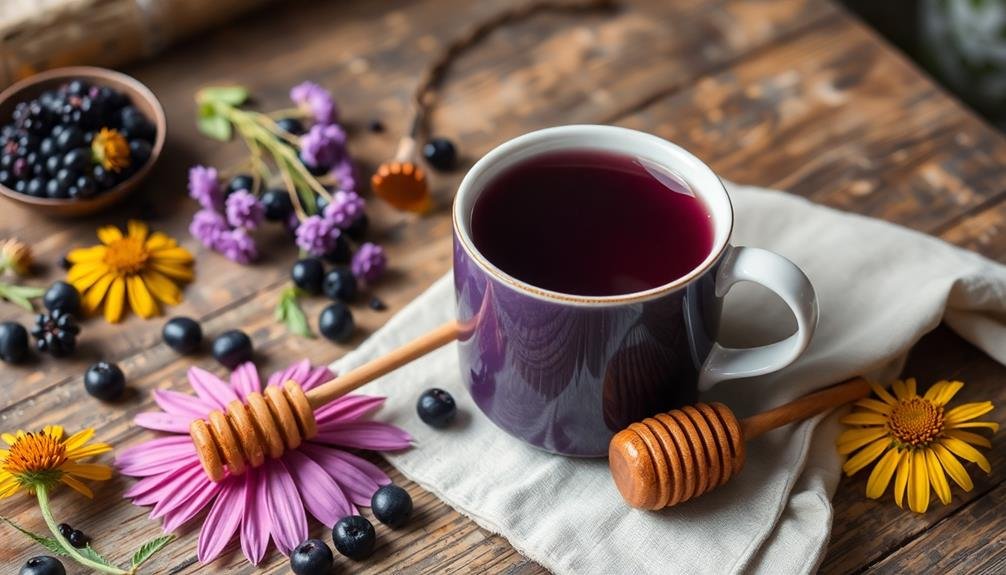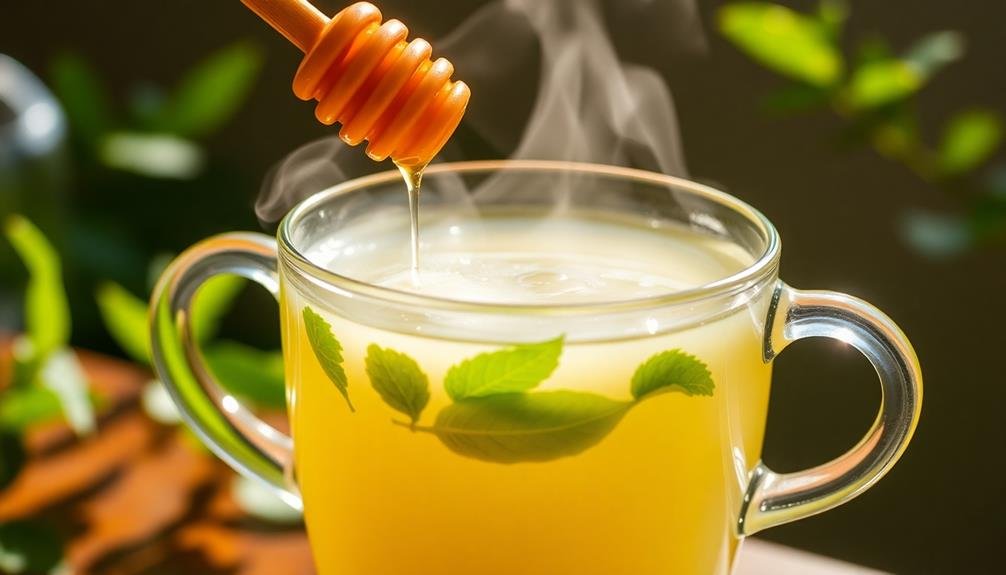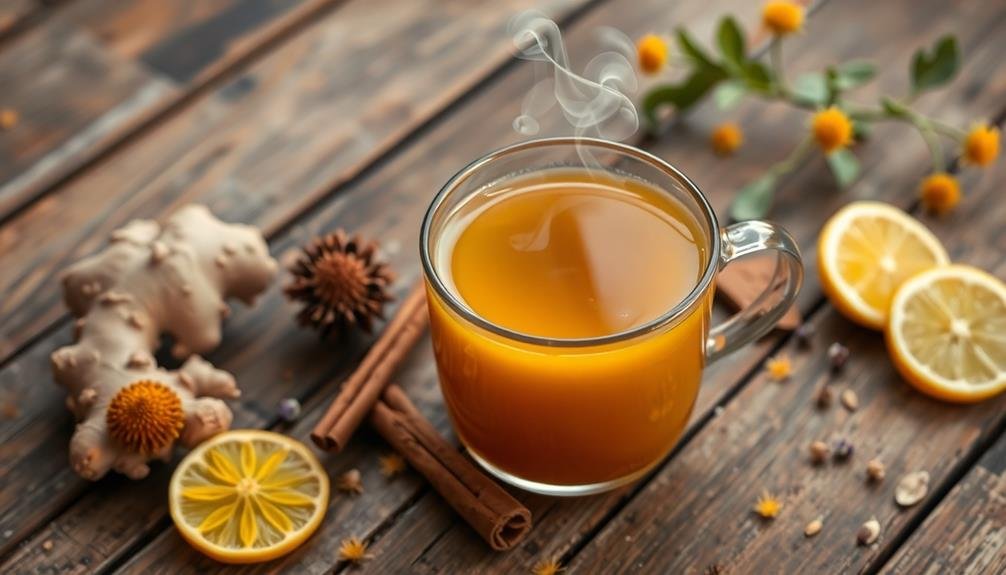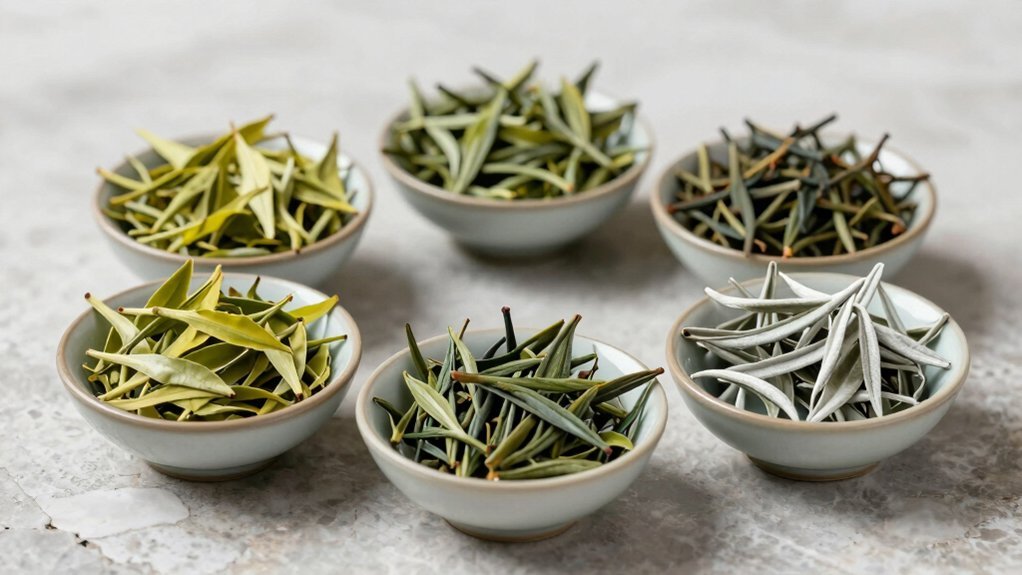When you're battling a fever, these three herbal tea blends can help boost your immunity and ease symptoms. The Elderberry and Echinacea Blend combines antiviral properties with immune-stimulating effects, while the Ginger Turmeric Fusion induces sweating and provides anti-inflammatory benefits. For a cooling effect, try the Lemon Balm Mint Infusion, which fights infections and promotes better sleep. Each blend offers unique properties to support your body's natural defenses and reduce fever-related discomfort. Simply steep the herbs in hot water, strain, and enjoy 2-3 times daily for best results. Discover how these powerful herbal combinations can transform your fever-fighting routine.
Elderberry and Echinacea Blend

Whip up an elderberry and echinacea blend to give your immune system a powerful boost when fighting a fever. This dynamic duo combines the antiviral properties of elderberry with echinacea's immune-stimulating effects.
Elderberry's high vitamin C content and anthocyanins help reduce inflammation and combat flu-like symptoms, while echinacea activates white blood cells to fight off infections.
To prepare this potent tea, steep 1 teaspoon of dried elderberries and 1 teaspoon of echinacea root in 8 ounces of hot water for 10-15 minutes. Strain and add a touch of honey for sweetness if desired. You can also find pre-made tea bags containing both herbs for convenience.
Drink this blend 2-3 times daily when you're feeling under the weather. It's especially effective at the onset of symptoms.
However, don't rely solely on herbal remedies for severe fevers or prolonged illnesses. Always consult your healthcare provider if symptoms persist or worsen.
Ginger Turmeric Fusion
A powerhouse duo, ginger and turmeric combine to create a potent fever-fighting tea blend. These two root spices have been used for centuries in traditional medicine to combat various ailments, including fevers. Ginger's warming properties help induce sweating, which can lower body temperature, while turmeric's anti-inflammatory effects work to reduce fever-related discomfort.
To make this fusion, you'll need:
| Ingredient | Amount | Benefits |
|---|---|---|
| Fresh ginger | 1-inch piece | Antiviral, anti-inflammatory |
| Ground turmeric | 1/2 teaspoon | Antioxidant, immune-boosting |
| Lemon juice | 1 tablespoon | Vitamin C, detoxifying |
| Raw honey | 1 teaspoon | Antibacterial, soothing |
| Hot water | 1 cup | Hydration, extraction |
Grate the ginger and add it to a cup with the turmeric. Pour hot water over the mixture and let it steep for 5-10 minutes. Strain the tea, then add lemon juice and honey to taste. Drink this tea 2-3 times a day when you're feeling feverish. You'll notice its warming effect almost immediately, helping you feel more comfortable as your body fights off the infection.
Lemon Balm Mint Infusion

Invigorating and soothing, a lemon balm mint infusion offers a delightful blend to combat fever symptoms. This powerful combination harnesses the medicinal properties of two potent herbs to help reduce your body temperature and alleviate discomfort.
Lemon balm, a member of the mint family, boasts antiviral properties that can help fight off infections causing your fever. It's also known for its calming effects, which can ease restlessness and promote better sleep during illness.
Peppermint, on the other hand, contains menthol, a natural cooling agent that can help lower your body temperature and provide relief from fever-induced headaches.
To prepare this infusion, steep 1 tablespoon each of dried lemon balm and peppermint leaves in a cup of hot water for 5-10 minutes. Strain and add a touch of honey if desired. Drink this tea 2-3 times daily when you're feeling feverish.
You'll appreciate the revitalizing taste and aroma of this blend, which can help clear your sinuses and soothe a sore throat.
The combination of lemon balm and mint also supports digestive health, addressing potential stomach discomfort that often accompanies fevers.
Frequently Asked Questions
How Long Should I Steep Herbal Teas for Maximum Fever-Fighting Benefits?
You'll want to steep your herbal teas for 5-10 minutes to maximize their fever-fighting benefits. Don't steep longer, as it can make the tea bitter. Use hot, not boiling water for the best results.
Can I Add Honey to These Tea Blends Without Reducing Their Effectiveness?
You can add honey to your tea blends without worrying. It won't reduce their effectiveness and may even enhance the benefits. Honey's natural antibacterial properties can complement the fever-fighting qualities of herbal teas, making them more potent.
Are These Herbal Teas Safe for Pregnant Women or Nursing Mothers?
You should be cautious with herbal teas during pregnancy or while nursing. Some herbs can be harmful. Always consult your healthcare provider before consuming any herbal tea. They'll advise you on which ones are safe for you.
How Many Cups of These Teas Should I Drink Daily When Fighting a Fever?
When you're fighting a fever, aim for 3-4 cups of herbal tea daily. You'll want to space them out throughout the day. Remember to stay hydrated with water too. Don't overdo it; listen to your body's needs.
Can I Mix Different Herbal Tea Blends for a More Potent Fever-Fighting Effect?
Yes, you can mix different herbal tea blends for a stronger fever-fighting effect. It's a great way to combine various beneficial properties. Just be mindful of potential interactions and don't overdo it. Consult a healthcare professional if unsure.
In Summary
You've now discovered three powerful herbal tea blends to boost your immunity and fight fever. Whether you choose the antiviral elderberry and echinacea, the anti-inflammatory ginger and turmeric, or the soothing lemon balm and mint, you're equipping your body with natural defenses. Remember to drink these teas regularly, especially during cold and flu season. Don't forget to consult your healthcare provider before adding new herbs to your routine, especially if you're taking medications or have existing health conditions.





Leave a Reply